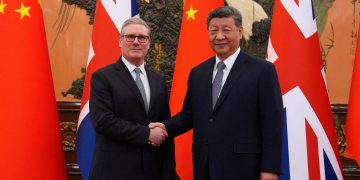
The chief executive of the UK’s biggest commercial news publisher has called for big tech regulation so the platforms pay for content and prioritise reliable information.
Reach CEO Jim Mullen said regulation should make the advertising market less “heavily distorted” in the platforms’ favour.
Speaking at a dinner held by The Stationers’ Company in London on Wednesday, Mullen said there is “simply too much power in the hands of platforms and their algorithms” because news consumption is so disintermediated through channels outside publishers’ control.
“Too much power in that they can hoover up the advertising revenue and threaten the existence of advertising-subsidised news and too much power to promote unreliable, untrustworthy and unscrupulous news,” he said.
Mullen said “this decade has seen more people than ever before consuming news” meaning the fundamental problem is not about attracting audiences.
“The bigger challenge is revenue, and here the tech platforms have a part to play too, but so far they have refused to negotiate openly on the value of journalistic content.”
In May the UK Parliament passed the Digital Markets, Competition and Consumers Act which will enable tech companies like Google, Apple and Facebook to be given “strategic market status” and be regulated. This could result in the platforms being compelled to pay publishers for the use of their news content and inform them of upcoming algorithm changes.
Justin Madders MP, who has ministerial responsibility for competition, has said the aim is for the pro-competition regime to be brought into effect in December or January with market investigations to be launched by the Competition and Markets Authority “shortly afterwards”.
Mullen said: “Platforms have so far resisted efforts to be lumped in with publishers and the responsibilities we carry. They don’t determine reliable news, they don’t place a value on trusted sources, they just provide avenues of news for the reader to browse.
“It’s why politics of deliberate division and misinformation have sprung up. It’s why teams of people work to influence attitudes and feelings in other countries. It’s why recent elections and referendums have been influenced by such operators. We all know this goes on, but little has been done to protect the end user from such operations.”
“If platforms are regulated to pay the providers for the content they so freely offer, if they are regulated so that the advertising market is not so heavily distorted in their favour and that reliable trustworthy news is prioritised in their feeds, then there is hope.”
Yesterday (Sunday), the editor of Reach-owned Liverpool Echo, Maria Breslin, published a call for the future of regional journalism to be on the Government’s agenda as the Labour Party conference opened in her city.
Breslin cited the importance of the Echo’s fact-checked journalism in the aftermath of the recent fatal stabbings of young girls in Southport and the riots that followed.
“But the sad truth is we operate in a world where tech giants make big money from the content we lovingly produce and where peddlers of mistruths seemingly operate freely and without scrutiny,” she said.
“In the right hands that advertising revenue would strengthen brands like the Liverpool Echo and help ensure trusted news is free for all and not a nice-to-have based on the ability to pay.”
Publishers are increasingly allies
Mullen said that in the face of such challenges, publishers must work more collaboratively than ever – echoing comments made by DMG Media CEO Rich Caccappolo to the Press Gazette Future of Media Technology conference.
“My competitors are still The Sun, the Mail and The Guardian but increasingly they are our allies as we are fighting an existential battle for survival because of the competition from the likes of Google and Meta,” Mullen said.
Merits of advertiser-funded journalism over paywalls
Reach is among the publishers most vulnerable to major algorithm and strategy changes from Google and Facebook as all of its sites are advertising-funded with no paywalls.
Mullen said: “Advertising-funded journalism has its flaws and challenges but, for over 100 years, it has played an essential role in public life. It is the model that made news affordable for the masses. Think about it and how we take news and access to it for granted.”
Referring to the idea that the answer to sustainability may be in building a strong subscription-based business, Mullen responded: “It is not for me to comment on others’ business models but you’ll forgive me if I pause and ask you to think about what this means for us as a society and as a democracy.
“Is it right that news, the news to make important decisions and the news to fully understand what is happening either in your council or your Government, has to be paid for through a monthly subscription?
“Before you say well the papers were never free, that is true, but those papers contain so much more than just news, they have games, puzzles, TV guides, guides to the day ahead, horoscopes and cartoons. They are a day’s entertainment not just news… News cannot be seen as a luxury, because to do so strips the basic rights of people to be able to judge their government, to form an opinion and to have a voice that answers back to that government.”
Mullen also raised concerns shared by numerous commercial publishers about the BBC’s impact on the ecosystem.
He said their recent increased investment in local digital news output (at the expense of local radio) “does raise questions to me over their remit and the fairness of a tax funded free news website if it is at the expense of a varied commercial news ecosystem”,
He concluded: “All we want is a level playing field because with that, as we have for years, we can show that advertising funded journalism works, it puts reliable news and information into everyone’s hands and allows them to make informed decisions about the future.”
The post Reach CEO Jim Mullen says regulation needed to save free online news appeared first on Press Gazette.





























